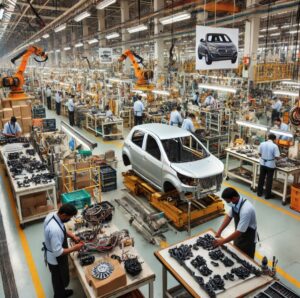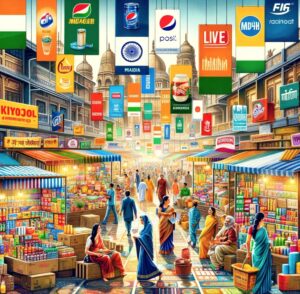Introduction
India’s automotive component industry is witnessing significant growth, driven by increased vehicle production and evolving consumer preferences. This analysis explores the competitive landscape of five prominent companies: Amara Raja, TVS, Sundaram-Clayton, Exide, and Motherson Sumi. These companies play crucial roles in various segments of the automotive industry, from batteries and electrical components to engine and body parts.
Business Models and Segments
Amara Raja
Amara Raja is renowned for its batteries, primarily serving automotive and industrial applications. Its business model revolves around manufacturing and distributing lead-acid batteries for both original equipment manufacturers (OEMs) and the aftermarket. The company operates through its flagship brand, Amaron, and has a robust distribution network across India and several international markets.
TVS Group
TVS Group, through its various subsidiaries, operates in multiple segments of the automotive industry. TVS Motor Company focuses on two-wheelers and three-wheelers, while Sundaram Fasteners and Lucas TVS are involved in manufacturing automotive components. The group’s business model is diversified, leveraging synergies across its subsidiaries to drive growth and innovation.
Sundaram-Clayton
Sundaram-Clayton is a key player in the manufacture of aluminium die-castings, primarily catering to the automotive industry. It supplies components for engines, transmissions, and body parts. The company’s business model focuses on leveraging advanced manufacturing technologies and maintaining strong relationships with global OEMs.
Exide Industries
Exide Industries is a leading battery manufacturer, with a significant presence in both automotive and industrial segments. Its business model includes producing a wide range of batteries, from automotive lead-acid batteries to industrial batteries for power backup. Exide has a strong distribution network and a significant aftermarket presence.
Motherson Sumi Systems
Motherson Sumi Systems (MSSL) is one of the largest automotive component manufacturers globally. It operates in multiple segments, including electrical distribution systems, polymer products, and metal components. MSSL’s business model focuses on acquiring and integrating companies to expand its product portfolio and global footprint.
Future Strategies
Amara Raja
Amara Raja aims to diversify its product portfolio by investing in lithium-ion battery technology, aligning with the global shift towards electric vehicles (EVs). The company is also enhancing its renewable energy solutions and expanding its international presence to tap into new markets.
TVS Group
TVS Motor Company is focusing on expanding its electric vehicle lineup and strengthening its presence in international markets. The group is also investing in advanced manufacturing technologies and digital transformation initiatives to improve efficiency and customer engagement.
Sundaram-Clayton
Sundaram-Clayton is investing in advanced manufacturing technologies, such as automation and digitalization, to improve productivity and reduce costs. The company is also exploring opportunities in the EV market by developing components for electric powertrains.
Exide Industries
Exide is heavily investing in lithium-ion technology and establishing a strong foothold in the EV battery segment. The company is also focusing on expanding its recycling operations and enhancing its R&D capabilities to develop innovative and sustainable energy storage solutions.
Motherson Sumi Systems
MSSL continues its strategy of growth through acquisitions, aiming to diversify its product offerings and enter new markets. The company is also investing in digitalization and automation to enhance operational efficiency and stay ahead in the competitive landscape.
Strengths and Weaknesses
Amara Raja
Strengths:
- Strong brand recognition (Amaron).
- Extensive distribution network.
- Focus on innovation and sustainability.
Weaknesses:
- Heavy reliance on lead-acid batteries.
- Increasing competition in the lithium-ion segment.
TVS Group
Strengths:
- Diversified business model.
- Strong presence in the two-wheeler market.
- Robust R&D capabilities.
Weaknesses:
- High competition in the automotive market.
- Dependency on the Indian market.
Sundaram-Clayton
Strengths:
- Expertise in aluminium die-casting.
- Strong relationships with global OEMs.
- Advanced manufacturing capabilities.
Weaknesses:
- Limited product diversification.
- Vulnerability to fluctuations in raw material prices.
Exide Industries
Strengths:
- Leading market position in the battery segment.
- Strong distribution network.
- Comprehensive product portfolio.
Weaknesses:
- Dependence on lead-acid batteries.
- Intense competition in the lithium-ion market.
Motherson Sumi Systems
Strengths:
- Global presence and extensive product portfolio.
- Successful acquisition strategy.
- Strong relationships with major OEMs.
Weaknesses:
- Complexity of integrating acquired companies.
- Exposure to global market risks.
Profit Formulas
Amara Raja
Amara Raja’s profit formula relies on high-volume production of batteries, efficient supply chain management, and maintaining a strong presence in both OEM and aftermarket segments. The company’s focus on quality and innovation helps command premium pricing.
TVS Group
TVS Group’s profit formula is driven by its diversified product range, economies of scale, and strong brand equity in the two-wheeler market. The group leverages its synergies across subsidiaries to optimize costs and enhance profitability.
Sundaram-Clayton
Sundaram-Clayton’s profit formula revolves around its specialization in high-quality aluminium die-castings, long-term relationships with OEMs, and continuous investment in advanced manufacturing technologies to reduce costs and improve efficiency.
Exide Industries
Exide’s profit formula is based on its leading market position, extensive product range, and strong distribution network. The company focuses on maintaining cost leadership through efficient manufacturing processes and economies of scale.
Motherson Sumi Systems
MSSL’s profit formula is driven by its global presence, diverse product portfolio, and successful acquisition strategy. The company leverages its extensive manufacturing capabilities and relationships with OEMs to achieve cost efficiencies and drive profitability.
Investors and Customers
Amara Raja
Investors: Institutional investors, mutual funds, and retail investors. Customers: OEMs in the automotive and industrial sectors, aftermarket distributors, and individual consumers.
TVS Group
Investors: Institutional investors, mutual funds, and retail investors. Customers: Individual consumers (two-wheelers and three-wheelers), automotive OEMs, and industrial clients.
Sundaram-Clayton
Investors: Institutional investors, mutual funds, and retail investors. Customers: Global automotive OEMs, Tier-1 suppliers, and industrial clients.
Exide Industries
Investors: Institutional investors, mutual funds, and retail investors. Customers: Automotive OEMs, industrial clients, and aftermarket consumers.
Motherson Sumi Systems
Investors: Institutional investors, mutual funds, and retail investors. Customers: Major global automotive OEMs, Tier-1 suppliers, and industrial clients.
Market Capitalization
As of the latest data:
- Amara Raja: Approximately ₹14,000 crores.
- TVS Motor Company: Approximately ₹30,000 crores.
- Sundaram-Clayton: Approximately ₹3,000 crores.
- Exide Industries: Approximately ₹15,000 crores.
- Motherson Sumi Systems: Approximately ₹65,000 crores.
Conclusion
Amara Raja, TVS, Sundaram-Clayton, Exide, and Motherson Sumi are pivotal players in India’s automotive component industry, each with unique strengths and strategic approaches. Amara Raja and Exide focus on the battery segment, while TVS and Sundaram-Clayton diversify across automotive components and vehicle manufacturing. Motherson Sumi stands out with its global presence and extensive product portfolio. Understanding these companies’ business models, strategies, and market positions provides valuable insights into their competitive dynamics and future potential in the evolving automotive landscape.




